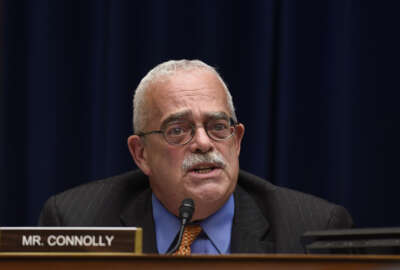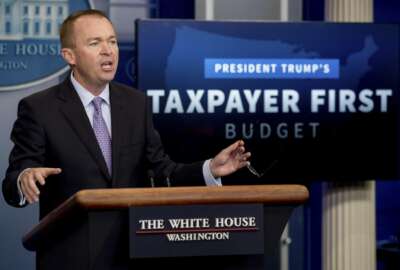
Trump sets 2018 pay raise for federal employees
President Donald Trump authorized a pay raise for civilian and military employees beginning Jan. 1, 2018.
President Donald Trump is exercising his authority to give federal civilian employees and uniformed service members a pay raise effective Jan. 1, 2018.
Most civilian federal employees will receive an average raise of 1.4 percent, with an additional 0.5 percent adjusted in locality pay for a total of a 1.9 percent.
“I have determined that for 2018, across-the-board pay increases will be 1.4 percent and locality pay increases will average 0.5 percent, resulting in an overall average increase of 1.9 percent for civilian federal employees,” Trump wrote in a letter to congressional leaders. “I will specify locality pay percentages for each locality pay area by executive order before the first pay period in January 2018. These decisions will not materially affect our ability to attract and retain a well-qualified federal workforce.”
Members of the military will receive an average raise of 2.1 percent starting next year.
In his letter to Congress, the president reminded lawmakers that the federal pay raises that have taken effect in recent years have typically been lower than the adjustments set under statutory formula, citing “national emergency” or “serious economic conditions.”
Specifically, locality pay increases worth about $26 billion were set to average 26.16 percent next year. Presidents often adjust locality pay lower than what the statutory formula calls for, but Trump emphasized this point clearly, adding that a locality adjustment of this magnitude isn’t “warranted.”
Trump’s Aug. 31 announcement was mostly expected, as 1.9 percent raise for civilian workers is in line with the president’s full 2018 budget proposal. An annual across-the-board pay adjustment formula in the Federal Employees Pay Comparability Act sets raises for most federal employees under the General Schedule. The president can choose to differ from this formula, and Congress can ultimately propose and pass any alternative numbers in its budget.
The Office of Personnel Management also referenced an expected 1.9 percent raise, when earlier this month it asked agencies to review and submit requests earlier for alternative pay rates for positions that are often difficult to fill.
The raise is just slightly below the 2.1 percent raise President Barack Obama ordered late last year.
And 1.9 percent is well below the raise some federal employees unions and organizations, as well as some members of Congress, called for earlier this year.
Rep. Gerry Connolly (D-Va.) and Sen. Brian Schatz (D-Hawaii) reintroduced the Federal Adjustment of Income Rates (FAIR) Act in January, which proposes a 3.2 percent pay raise for federal employees in 2018. The House version of the bill has support from 67 Democrats and 1 Republican co-sponsor, Rep. Barbara Comstock (R-Va.). Schatz’s version in the Senate has seven co-sponsors, all of them Democrats.
The National Treasury Employees Union said the president’s pay plan “shortchanges” federal employees, particularly given the uncertainty around the administration’s proposals to cut federal retirement benefits.
“NTEU believes this figure is too low especially in light of the fact that federal law calls for a 1.9 percent across-the-board raise and private sector wages are growing at an even faster rate,” National President Tony Reardon said in a statement. “Add to that, current proposals attacking the federal retirement system would result in a pay cut for federal workers.”
The National Active and Retired Federal Employees association applauded the raise but argued it still falls short of most private sector salaries.
“While federal employees will appreciate the raise, an average increase of 1.9 percent is the minimum required to prevent federal pay from declining further, and more rapidly, below market than the current 35 percent wage disparity between public- and private-sector wages,” Richard Thissen, NARFE national president, said in a statement. “Both Congress and the president should work together to pursue a more robust pay increase to maintain the highly qualified workforce needed to run an efficient federal government.”
The American Federation of Government Employees echoed other federal organizations’ calls for pay parity and welcomed the “modest boost in pay.”
“At a time when federal workers are front and center in disaster relief in Texas, it’s vital for the American public to recognize their dedication and work,” AFGE National President J. David Cox said in a statement. “It’s beyond time for them to be fairly compensated for the jobs they do.”
Congress so far has been relatively silent on a pay raise for civilian federal employees in 2018. The House Appropriations Financial Services and General Government Subcommittee approved a 1.9 percent raise for civilian employees in its 2018 spending bill. The Senate Appropriations Committee has yet to take up a bill on the topic.
Lawmakers have little time when they return from summer recess Sept. 5 to come to some sort of budget solution for fiscal 2018. The end of the fiscal year ends Sept. 30.
Copyright © 2024 Federal News Network. All rights reserved. This website is not intended for users located within the European Economic Area.
Nicole Ogrysko is a reporter for Federal News Network focusing on the federal workforce and federal pay and benefits.
Follow @nogryskoWFED






